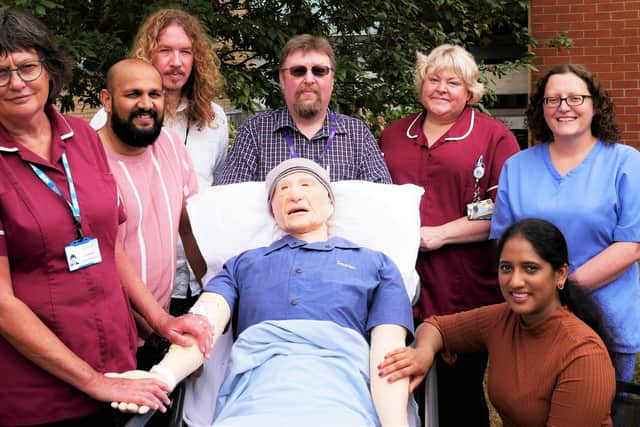KGH palliative care team shortlisted for top national award
and live on Freeview channel 276
A Kettering General Hospital team which uses high-tech manikins for end-of-life care training is up for a top national award.
The hospital’s palliative care team has been shortlisted for a 2022 Nursing Times Award in the enhancing patient dignity category.
Advertisement
Hide AdAdvertisement
Hide AdThey have a unique end-of-life care training package - developed by KGH palliative care nurse specialist Jan Murts - which uses scenario training and simulation manikins to help staff experience and learn from the many considerations and stresses involved in end-of-life care.


Jan said: “Enhancing patient dignity is essential for our dying patients, who are often vulnerable and unable to maintain their own privacy or dignity.
“It is imperative that nurses are provided with the skills to ensure competent, confident, and compassionate, individualised care.
“I saw the potential that simulation training could have for staff dealing with these potentially difficult situations and we have developed a very powerful and memorable way of helping them to prepare to give the best possible care for patients and support for relatives.”
Advertisement
Hide AdAdvertisement
Hide AdThe KGH team is up against three other teams from North Stafford, Shropshire, and Tameside and Glossop. The awards will be presented at a ceremony in London on October 26.
End-of-life care simulation training for nurses was launched in 2019 and each simulation day covers five scenarios, based on real end-of-life care situations.
Macmillan transformation lead nurse for end-of-life care, Sarah Parry, said: “Scenarios have included management of seizures, pain, breathlessness, secretions, agitation, bleeding, breaking bad news on the telephone, dealing with distressed relatives and individualised care planning in the last days of life.
“In each scenario there is either a health care assistant (HCA) or relative, played by a specialist palliative care nurse and the patient is either a staff actor or the ‘SimMan’ manikin.
Advertisement
Hide AdAdvertisement
Hide Ad“A palliative medicine consultant is in the control room with a simulation suite technician, they lead the scenario, communicating via an earpiece with the specialist nurse to help guide the candidates when needed.”
The experience is very realistic because the consultant and technician can use sound effects in the manikin, alter any monitor readings throughout the scenarios, and play the role of a doctor, if the candidate chooses to ask for medical advice.
The staff taking part in the scenario operate in pairs and the other staff involved in the training observe the scenario via video-link. Afterwards there is a debrief where what happened, and ways to improve, are discussed.
Kettering General Hospital’s interim director of nursing, Fiona Barnes, said: “Jan and the team have done an amazing job in developing this unique training package.
Advertisement
Hide AdAdvertisement
Hide Ad“Jan originally identified the potential of simulation training in this area which is completely different to traditional approaches.
“It provides a safe environment for nurses to practice communication skills, compassion, provide individualised care plans and explore their current knowledge and skills around end-of-life care, manage common symptoms, and manage situations they find challenging.
“The debrief component also provides an opportunity for them all to reflect on their practice and take into consideration how they communicate with patients, care for them, manage their symptoms and consider the needs of their relatives.
“The impact this training has had, and the response from staff learning this way, exceeds anything we have witnessed in the past.”